
CIHT staff joined CIHT Members and departmental officials in Prague for the 27th edition of the World Road Congress where they shared their ideas and innovations on road infrastructure and transportation.
Join other savvy professionals just like you at CIHT. We are committed to fulfilling your professional development needs throughout your career
Every four years, the World Road Association (PIARC) hold the World Road Congress which brings together delegates from 142 member countries with the aim to share techniques and experiences from around the world, in the field of road infrastructure and road transportation. This cycle, the 27th World Road Congress was held in Prague and saw 4,263 delegates attend to share their ideas on topics such as road design, construction, maintenance, road safety, climate change and resilience, sustainable mobility, innovation, and EDI, to name a few!
UK was well represented with over 130 delegates attending the conference and sharing their ideas and the work they have been doing. The UK Pavilion, of which CIHT was a supporting partner, was a vibrant place for UK delegates to meet and share knowledge with international delegates. It was hard not to bump into a CIHT Member or Fellow whenever you visited the UK Pavilion, and many insightful conversations were had. Below is a summary of the work shared by some CIHT members and staff during the congress.
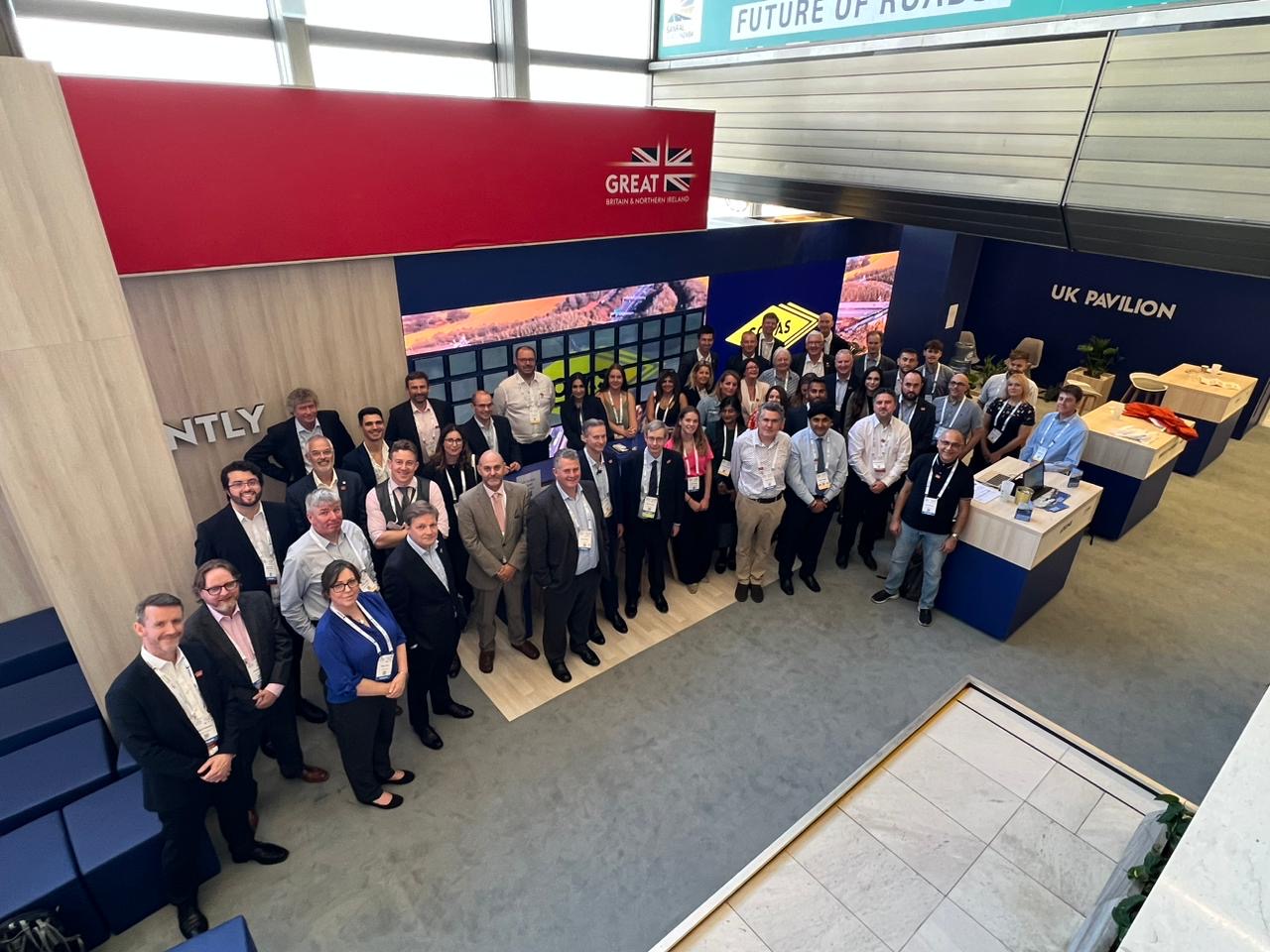
The UK Pavilion at the World Road Congress in Prague.
The theme of the UK Pavilion was focused on decarbonisation and diversity and built an engaging program of presentations on the stand. Some highlights from CIHT members included David Ogden MCIHT and Chair of PIARC UK who shared knowledge on Live Labs 2 which has a major focus on the decarbonisation for the local highways network. On a similar theme, Mike Wilson FCIHT from National Highways gave an outline of National Highways’ work to reduce emissions, which include actions in three areas to reach net zero:
• Deadline of 2030 for corporate emissions
• Deadline of 2040 for maintenance and construction emissions
• Deadline of 2050 for road users emissions
Fraser Arnot FCIHT from AtkinsRéalis presented at the UK pavilion on the importance of embedding active travel into road schemes, highlighting current UK best practice in this area along with the use of some innovative tools to provide safer and more inclusive facilities for all users. Safety and inclusive design are two key barriers to the uptake of active travel in the UK and to scheme progression, so it’s important that these are addressed from the outset and that any risks or issues are managed in a robust way.
Finally, given Scotland was the recent host of the World Cycling Championship, Hugh Gillies OBE FCIHT, was able to share lessons on how to run a successful travel demand program.
There were four Strategic Themes covered at the congress including mobility, road administration, safety and sustainability and resilient infrastructure. With support from CIHT, the UK submitted national reports on each of these themes.
‘Strategic Theme 1 – Road and road transport in a changed world’ focused on building resilience into road transport systems, funding and financing for road transport, adapting to changing user needs, and disaster management.
Stephen Fidler FCIHT, Co-Director, Local Transport at the Department of Transport (DfT) and the UK’s First Delegate to PIARC presented the UK’s national report titled ‘Rising to the Challenge: Responding to COVID and Climate Change in the UK’. The report was co-written by Justin Ward from CIHT and Stephen and it won the award for best National Report at the Congress. Highlighted in the report were several DfT policies developed for climate change in a post-COVID world such as the Transport Decarbonisation Plan, Gear Change, the National Bus Strategy for England, as well as National Highways’ Roadmap to Net Zero.
‘Strategic Theme 3 – Safety and Sustainability’ focused on new challenges and initiatives for improving safety and sustainability. PIARC specifically wanted reports on this theme to focus on creating safer road space and a vibrant community through the promotion of road traffic safety measures, sharing road space between pedestrians and vehicles, and developing a safe environment for using micro-mobility.
Justin Ward, MCIHT, Head of Policy and Technical Affairs at CIHT presented the UK’s national report for Strategic Theme 3, where he talked about the UK’s safe systems approach which promotes an attitude change towards safety as well as Scotland’s Road Safety Framework to 2030.
‘Strategic Theme 4 – Resilient Infrastructure’ focused on the improved life cycle management of road infrastructure in the course of digital transformation, i.e., data acquisition, data storage, data management, internet of things (IoT), the use of artificial intelligence (AI), and digital twins.
John Patterson MCIHT, Vice Chair of PIARC UK (the National Committee of PIARC in the UK) and Technical Director at AtkinsRéalis presented the UK’s national report on Strategic Theme 4 which highlighted the National Highway’s Digital Roads Strategy, the UK’s National Digital Twin Program and the progress the UK has made with connected vehicle services so far.
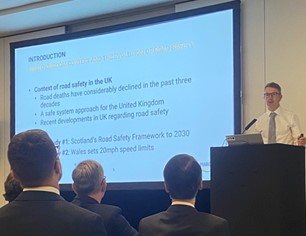
Justin Ward, MCIHT, Head of Policy and Technical Affairs at CIHT presented the UK’s national report for Strategic Theme 3.
Sue Percy, Chief Executive at CIHT has been part of PIARC’s Gender Inclusion and Diversity Team (PGIDT). Sue spoke at the British Embassy in Prague about the work the team have been doing to increase the understanding and awareness of PIARC members on the importance of gender diversity and inclusion, as well as creating an inclusive culture in PIARC. Sue highlighted that transport is not gender neutral. Women’s and men’s travel patterns and needs differ, due to the consequence of different conditions in everyday life and different values or priorities. Women are also not equally represented in the global transport workforce. For PIARC’s work to remain relevant and be effective, gender inclusion and diversity must be at its heart.
Sue was also involved in developing a foresight session on gender inclusive transport systems, which included presentations from representatives from America, Philippines, Tunisia, Slovack Republic, India and Ireland, talking about what gender inclusive transport means to them and how gender considerations can be included in the planning, design, construction and maintenance of transportation infrastructure.
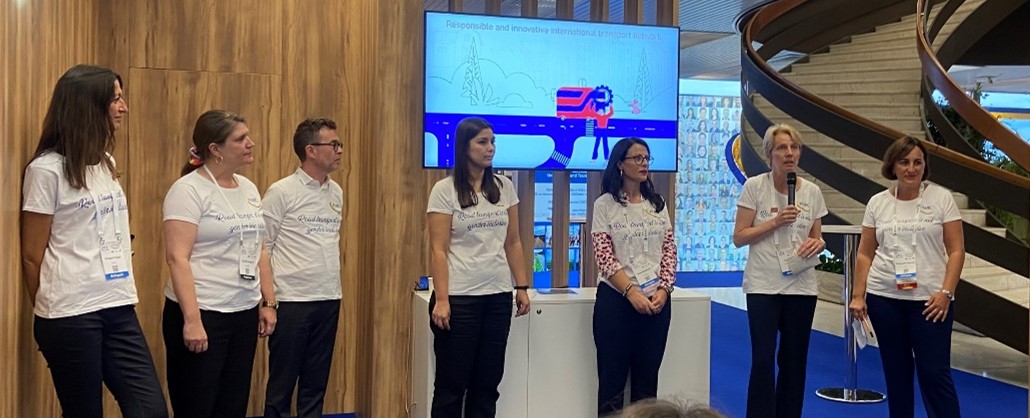
Sue Percy, with her fellow PGIDT members, talking about the work PIARC is doing on gender inclusion and diversity.
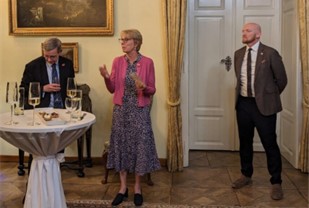
Sue Percy, Chief Executive at CIHT, talking about the work of PGIDT at the British Embassy with Stephen Fiddler, DfT (left) and Matt Field, UK Ambassador to the Czech Republic (right).
Isobel Wilson, Policy Advisor at CIHT and James Elliott FCIHT, Director at Elliott Asset Management presented CIHT’s recent work on Green and Blue Infrastructure (GBI), which won the PIARC UK Climate Change and Resilience award. Their research paper titled ‘How to encourage Green and Blue Infrastructure in the Transport Sector’ highlighted the environmental, economic, social and health benefits of GBI as well as the barriers to GBI implementation in the UK – a lack of awareness and associated negative connotations. They also highlighted the recommendations from the CIHT policy report on GBI which called for greater promotion of GBI, improved guidance and empowered local authorities.
Jonathan Spear FCIHT, Vice-Chair of PIARC's Project Oversight Team chaired a special project session which addressed innovation processes at an organisational level in the road sector. In this session we saw presentations from Germany on how they have managed a portfolio of innovation projects on the Autobahn, how research and innovation policy is developed in Uganda and what Belgium is doing to improve their organisational practices in innovation.
Jessica Tuck MCIHT, Technical Director (construction materials specialist) at AECOM, participated in a workshop on “Building a climate-responsive road sector” which looked at how new approaches - in particular digital solutions - can support the road sector to both mitigate its carbon footprint and anticipate climate change impact to avoid early repairs. Discussions focused on digitalisation and its contribution to building a climate-responsive sector, and Jessica provided the perspective of designers on implementing circular economy and low carbon solutions in road infrastructure projects.
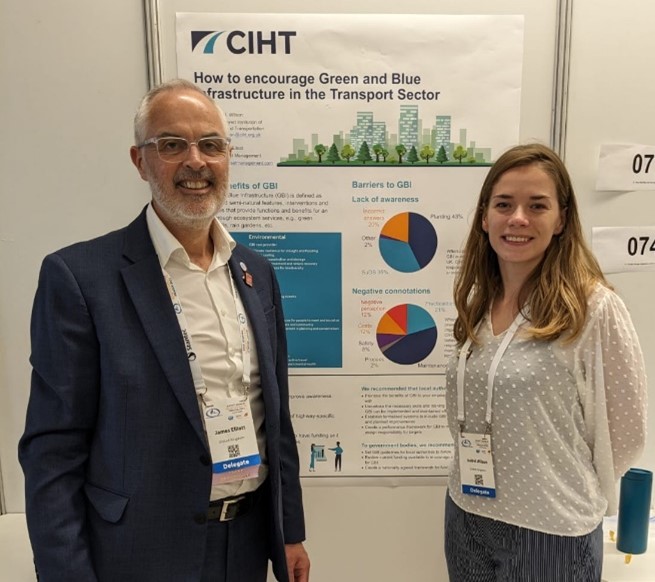
Isobel Wilson and James Elliott presenting their GBI poster as part of the climate change and resilience of road networks session.
Concrete pavements can provide near maintenance-free service for years. However, as their lives come to an end their behaviours become unstable, and their deterioration is difficult to predict. From AECOM Jessica Tuck MCIHT and Federico Perrotta MCIHT, Chair of the CIHT East Midlands Committee, presented the results of their award-winning study “A Novel Performance-Based Deterioration Model to Inform Asset Management Strategies of Legacy Concrete Pavements: a UK Case Study” which informed RIS3 planning, regarding legacy concrete pavements’ maintenance and renewal programme.
James Elliott FCIHT presented on the Road Network Operations / ITS Technical Committee’s work investigating how technological advances are influencing road network operations. Specifically, James presented on approaches to Mobility as a Service (MaaS) from the UK including its success in urban location as well as some pilot projects in rural areas. James also highlighted the importance of MaaS algorithms to act equitably across all transport modes to incentivise new service entrants, as well as the need for open and standardised data to make MaaS a success.
Jonathan Spear FCIHT put it best when he summarised ‘The World Road Congress is all about meeting, engaging with and being inspired by some truly talented industry leaders and professionals from all regions and countries of the World’.
If you would like to get more involved with the work PIARC does, please get in touch with CIHT’s Policy and Technical team at technical@ciht.org.uk.
For any press enquires please contact communications@ciht.org.uk.
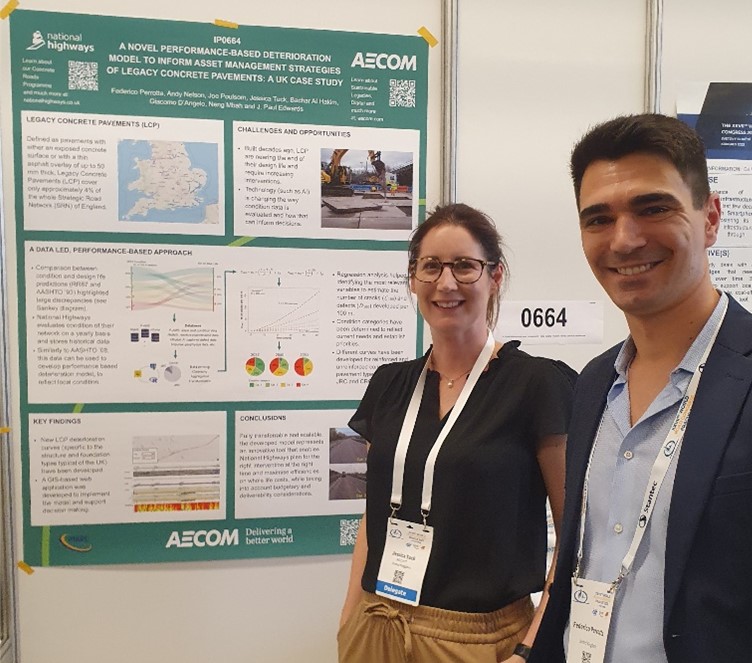
Jessica Tuck and Federico Perrotta presenting their poster in the road infrastructure asset management poster session.
Sign up to the APM Newsletter.
{{item.AuthorName}} {{item.AuthorName}} says on {{item.DateFormattedString}}: